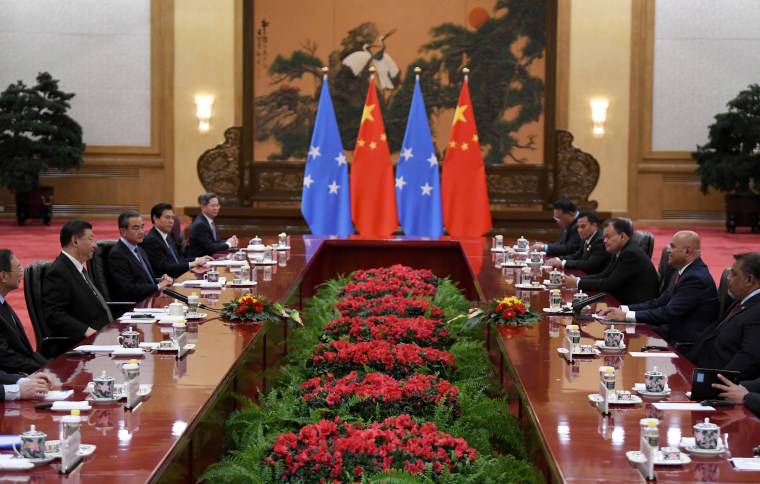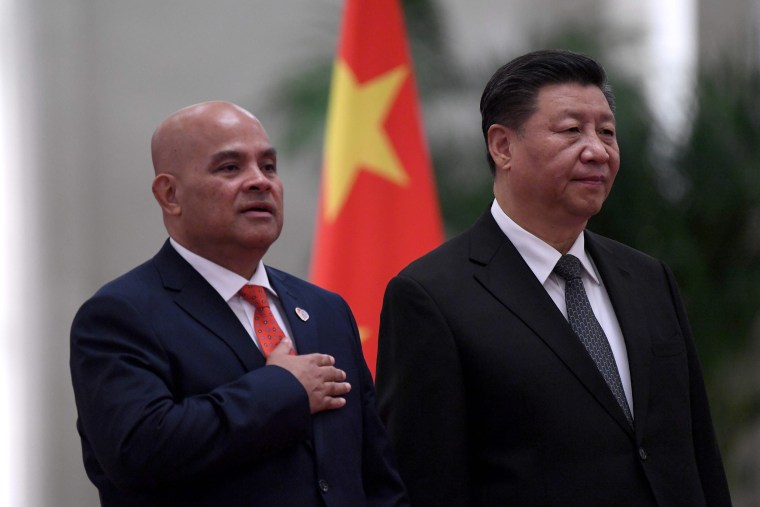BEIJING — Without firing a single shot, China has gained a major foothold in a strategically important island chain in the western Pacific that is considered vital to the United States military security.
David Panuelo, president of the Federated States of Micronesia — a nation of some 600 islands and islets with a population of just 113,000 — is this week visiting China, where President Xi Jinping and other top officials have come out in force to lavish him with attention and offers of economic cooperation deals.
Micronesia, along with the Marshall Islands and Palau, are bound by a "compact of free association" with the United States which gives Washington exclusive military control of the countries’ land, airspace and surrounding waters in exchange for hundreds of millions of dollars in assistance and other privileges. But in recent years, Micronesia has increasingly turned to Beijing for much needed investments and economic aid.
Together with Guam and the Northern Marianas, these countries ensure that Washington controls more than 3 million square miles in the western Pacific — about the size of the continental U.S. — which underpins American dominance in the Pacific, according to experts.
But the pact and its funding program are set to expire in 2023-2024, and the outcome of negotiations to extend it is uncertain.
According to Jonathan Pryke, director of the Pacific Islands program at the Lowy Institute, a think-tank based in Sydney, China began ramping up its engagement with the Pacific islands from 2006, and has been winning government contracts and infrastructure projects since then. China has become the region’s biggest bilateral lender in the past decade.

Micronesia’s main government offices, as well as the residences of the president, vice president, parliamentary speaker and the chief justice, as also a sports stadium, were built by China. Xi further bolstered ties by holding a summit with the leaders of Micronesia and seven other small island countries ahead of an Asia-Pacific gathering in Papua New Guinea in November last year.
"There are parts of the Chinese system that would like to build up influence in Micronesia, with the strategic ambition of setting up some sort of military facility but the compact relationship with the U.S. prohibits those," Pryke said by telephone from Sydney.
The island countries are also “trying to play both sides to get the best deal for themselves, some hedging and leverage work is at play, just what you’d expect of any country,” he added.
In the face of Chinese advances, Washington has started paying attention. Last May, President Donald Trump hosted the leaders of the compact countries for their first visit to the White House. In August, Secretary of State Mike Pompeo visited Micronesia — the first by a secretary of state — during which he announced negotiations to extend the compact. He was quoted as saying that the island nations must "sustain democracy in the face of Chinese efforts to redraw the Pacific."
Climate change is another issue China may use as a "wedge," Pryke said. "For these countries, it’s an existentialist crisis, they are facing obliteration."
While Trump has withdrawn from the Paris Agreement on climate change, China has said it will keep it.
"In a world of rising seas and warming waters, our future depends on far bigger countries doing more," Micronesia’s Panuelo wrote last October.
Still, the ball is "back in China’s court," Pryke said, arguing that China’s inroads have led to America’s reengagement and Australia stepping up its lead role in the region as a U.S. ally. "China will also have to step up if it has the ambition of reordering the strategic balance in the Pacific."
For Yang Yujun, a former spokesman of China’s Defense Ministry and now dean of media and public affairs at China’s Communications University, concerns about China’s military ambition are unfounded.
"China’s cooperation agreements with these countries is based on mutual benefit and mutual respect and will always seek to promote peace and stability in the region," he told NBC News on the sidelines of an international affairs forum in Beijing on Friday.
At the same forum, Chinese Foreign Minister Wang Yi assailed what he called Washington’s "almost paranoid" efforts to denigrate China. "The United States smears China's social system, its development path, and also its cooperation with other countries, making groundless accusations against China."
"Do you really believe that the island countries including Micronesia would like any other country to dominate them? I really don’t think so," Lu Kang, director of North America and Oceania affairs at the ministry, said when asked about China’s threat to America's dominant role in the region, adding that Micronesia and other countries "appreciate that China treats them on equal basis."
With more some $72 million worth of deals, it is "the most productive and engaging" visit ever, according to Micronesia’s Information Service report. Panuelo is now touring two southern Chinese provinces which will help Micronesia in agriculture and other projects.
